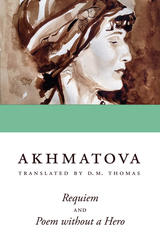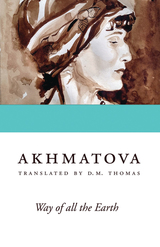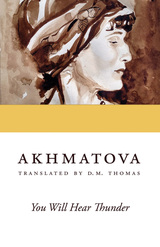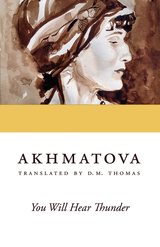
With this edition Swallow Press presents two of Anna Akhmatova’s best-known works that represent the poet at full maturity, and that most trenchantly process the trauma she and others experienced living under Stalin’s regime.
Akhmatova began the three-decade process of writing “Requiem” in 1935 after the arrests of her son, Lev Gumilev, and her third husband. The autobiographical fifteen-poem cycle primarily chronicles a mother’s wait—lining up outside Leningrad Prison every day for seventeen months—for news of her son’s fate. But from this limbo, Akhmatova expresses and elevates the collective grief for all the thousands vanished under the regime, and for those left behind to speculate about their loved ones’ fates. Similarly, Akhmatova wrote “Poem without a Hero” over a long period. It takes as its focus the transformation of Akhmatova’s beloved city of St. Petersburg—historically a seat of art and culture—into Leningrad. Taken together, these works plumb the foremost themes for which Akhmatova is known and revered. When Ohio University Press published D. M. Thomas’s translations in 1976, it was the first time they had appeared in English. Under Thomas’s stewardship, Akhmatova’s words ring clear as a bell.

Anna Akhmatova is considered one of Russia’s greatest poets. Her life encompassed the turmoil of the Russian Revolution and the paranoia and persecution of the Stalinist era: her works embody the complexities of the age. At the same time, she was able to merge these complexities into a single, poetic voice to speak to the Russian people with whom she so closely and proudly identified.
Way of All the Earth contains short poems written between 1909 and 1964, selected from Evening, Rosary, White Flock, Plantain, Anno Domini, Reed, and The Seventh Book. Intricately observed and unwavering in their emotional immediacy, these strikingly modern poems represent one of the twentieth century’s most powerful voices.

Anna Akhmatova lived through pre-revolution Russia, Bolshevism, and Stalinism. Throughout it all, she maintained an elegant, muscular style that could grab a reader by the throat at a moment’s notice. Defined by tragedy and beauty in equal measure, her poems take on romantic frustration and the pull of the sensory, and find power in the mundane. Above all, she believed that a Russian poet could only produce poetry in Russia.
You Will Hear Thunder spans Akhmatova’s very early career into the early 1960s. These poems were written through her bohemian prerevolution days, her many marriages, the terror and privation of life under Stalin, and her later years, during which she saw her work once again recognized by the Soviet state. Intricately observed and unwavering in their emotional immediacy, these strikingly modern poems represent one of the twentieth century’s most powerful voices.

Anna Akhmatova (1889–1966) was part of that magnificent and in many ways tragic generation of Russian artists which came to first maturity before 1917, and which then had to come to terms with official discouragement and often persecution. As D.M. Thomas points out in his introduction, practically none of her poetry was published between 1923 and 1940. Her poetic range was wide, from the transparent anonymity of “Requiem” to the symphonic complexity of “Poem without a Hero.” She was revered and loved not only by the best of her fellow poets but by the ordinary people of Russia: five thousand mourners, mostly the young, crowded to her requiem mass in a Leningrad church.
You Will Hear Thunder brings together for the first time all D.M. Thomas’s translations of Anna Akhmatova’s poems. They were very highly praised on their separate appearances in 1976 and 1979. John Bayley called them “a mastery achievement,” and said of Thomas that “he has profound reverence and affection for the original;” while Donald David wrote that Thomas’s translation was “The first version to explain to me why Akhmatova was so much esteemed by those great poets, Pasternak and Mandelstam and Tsvetaeva.” It is good to have these powerful, noble and compassionate poems in one set of covers.
READERS
Browse our collection.
PUBLISHERS
See BiblioVault's publisher services.
STUDENT SERVICES
Files for college accessibility offices.
UChicago Accessibility Resources
home | accessibility | search | about | contact us
BiblioVault ® 2001 - 2024
The University of Chicago Press









